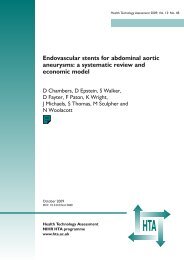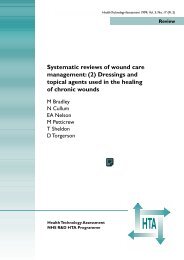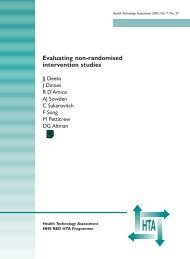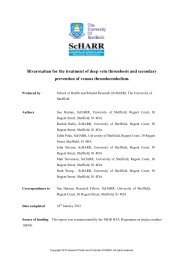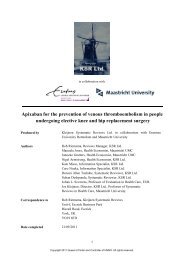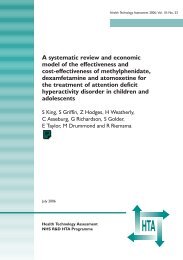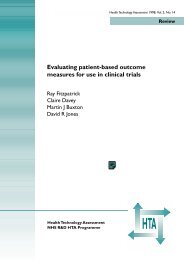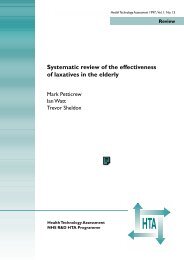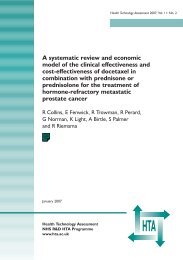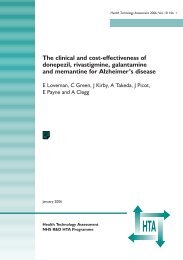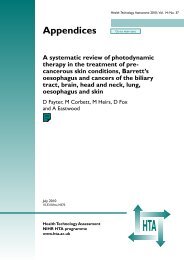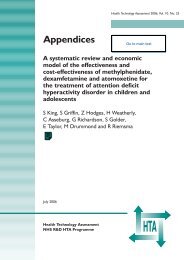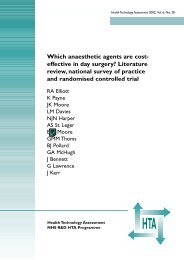How far does screening women for domestic (partner) - NIHR Health ...
How far does screening women for domestic (partner) - NIHR Health ...
How far does screening women for domestic (partner) - NIHR Health ...
Create successful ePaper yourself
Turn your PDF publications into a flip-book with our unique Google optimized e-Paper software.
52<br />
Review Question IV<br />
cognitive therapy component be<strong>for</strong>e the exposure<br />
therapy to establish whether the efficacy of the<br />
intervention was affected by the order in which<br />
the cognitive and exposure therapy components<br />
were delivered. Women were referred from the<br />
‘municipal centre <strong>for</strong> <strong>women</strong>’ and victim support<br />
centres, by judges of <strong>domestic</strong> violence cases and<br />
by housing advisors. Women in the intervention<br />
group showed significant decreases in depression<br />
and ‘maladaptation’ and significant increases in<br />
self-esteem 2 months from baseline. Although<br />
<strong>women</strong> in the intervention group had reductions<br />
in PTSD symptoms post-treatment, these were not<br />
significant when compared with the control group,<br />
apart from negative cognitions. No differences<br />
were found between the two intervention groups.<br />
Studies included in our previous review<br />
In our previous review 11 we examined two<br />
randomised controlled trials of a psychological<br />
intervention conducted by Kubany and<br />
colleagues. 145,146 The intervention was based on<br />
cognitive behavioural therapy and was targeted<br />
at <strong>women</strong> survivors of <strong>partner</strong> violence who had<br />
PTSD. Specifically, the intervention included<br />
elements from existing treatments <strong>for</strong> PTSD,<br />
feminist modules that focused on self-advocacy and<br />
empowerment strategies, assertive communication<br />
skill building, the managing of unwanted contact<br />
with <strong>for</strong>mer <strong>partner</strong>s, and identifying potential<br />
perpetrators to avoid revictimisation. The two<br />
evaluation studies, both randomised controlled<br />
trials, found a sustained improvement at 3 and 6<br />
months, respectively, in a range of mental health<br />
measures including PTSD, depression and selfesteem.<br />
In a randomised controlled study by Mancoske<br />
and colleagues, <strong>women</strong> who contacted a <strong>partner</strong><br />
violence agency were provided with a rapid<br />
response crisis intervention. 147 They were then<br />
randomly assigned either to feminist-oriented<br />
counselling or to grief resolution-oriented<br />
counselling, both of which were provided over<br />
eight weekly sessions by trained social workers<br />
and included basic problem-solving and<br />
psychoeducation. At the end of counselling, both<br />
groups showed improvements over baseline in<br />
self-esteem and self-efficacy, although these were<br />
only significant <strong>for</strong> <strong>women</strong> who received grief<br />
resolution-oriented counselling.<br />
In a parallel group study of <strong>women</strong> resident in<br />
a refuge or receiving refuge-associated services,<br />
conducted by McNamara and colleagues, two<br />
types of intervention were compared: individual<br />
counselling versus case management. 148,149 When<br />
assessed after three sessions, <strong>women</strong> in both groups<br />
showed significantly improved life satisfaction<br />
and coping ability compared with baseline values.<br />
Additionally, <strong>women</strong> who had received individual<br />
counselling showed a significantly greater increase<br />
in global improvement scores than <strong>women</strong> in the<br />
case management group.<br />
Group psychological interventions<br />
Studies published since our previous review<br />
Gilbert and colleagues 150 conducted a pilot study<br />
using a randomised controlled trial design to test<br />
the feasibility, safety and short-term preliminary<br />
effects of a relapse prevention and relationship<br />
safety (RPRS) intervention in reducing drug use<br />
and <strong>partner</strong> violence among <strong>women</strong> in methadone<br />
maintenance treatment programmes (MMTPs);<br />
the geographical region was not reported. The<br />
RPRS intervention consisted of eleven 2-hour<br />
group sessions and one individual session. The<br />
intervention was tailored to the realities of lowincome,<br />
African American and Latina <strong>women</strong> and<br />
focused on the enhancement of self-worth, ethnic<br />
pride and risk avoidance in the future. Materials<br />
and exercises incorporated social cognitive skill<br />
building. At the end of each session, participants<br />
were asked to commit to specific skills practice<br />
exercises between sessions. The control group<br />
received an in<strong>for</strong>mation session consisting of<br />
a 1-hour didactic presentation of a wide range<br />
of local community services that <strong>women</strong> in<br />
MMTPs can access, tips on help-seeking, and a<br />
comprehensive directory of local <strong>partner</strong> violence<br />
services. At the follow-up assessment <strong>women</strong> in<br />
the intervention group demonstrated reductions<br />
in minor physical, sexual and/or injurious <strong>partner</strong><br />
violence in the past 90 days. They were also more<br />
likely than <strong>women</strong> in the in<strong>for</strong>mation group<br />
to report a decrease in both minor and severe<br />
psychological <strong>partner</strong> violence. Other changes in<br />
abuse measures did not reach significance. Women<br />
in the intervention group also demonstrated<br />
decreases in depression at the 3-month followup.<br />
Compared with <strong>women</strong> in the control group,<br />
<strong>women</strong> in the intervention group were more likely<br />
to report a decrease in having sex while high on<br />
illicit drugs. Improvements regarding substance<br />
use and PTSD after receiving the intervention did<br />
not reach significance. No adverse events were<br />
detected.<br />
A cognitive behavioral therapy programme <strong>for</strong><br />
<strong>women</strong> referred from social services, counsellors<br />
and the judiciary who displayed post-traumatic



